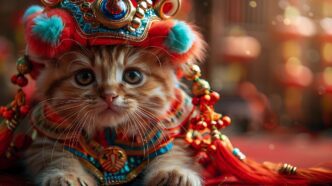Quick Takeaway
Animal & Element Origin
Impact on Personality
Diverse Interpretations
Choosing the perfect wedding date is a profound step for many couples, especially those who honor the rich traditions of Chinese astrology and calendrical wisdom. This ancient practice involves a meticulous analysis of celestial energies, elemental cycles, and personal birth charts to identify a day that promises the most auspicious start for a marital union, ensuring harmony, prosperity, and enduring happiness for the newlyweds. It’s a centuries-old tradition where individuals consult the Chinese calendar, often with the guidance of a master, to align their most significant life events with cosmic blessings, setting a powerful foundation for their future together.
The Deep Roots of Auspicious Timing
The practice of selecting auspicious dates for major life events, particularly weddings, is deeply ingrained in Chinese culture. It stems from the belief that timing is not merely a logistical consideration but a powerful factor that can influence the outcome and longevity of any endeavor. Just as `Feng Shui` optimizes the energy of a space, auspicious timing seeks to harness the most favorable `Qi` (life force) of a specific day.
This tradition is not about superstition but about aligning personal destinies with the natural rhythms of the universe. By choosing a blessed day, couples aim to mitigate potential challenges and maximize positive influences, believing it lays a strong, supportive energetic foundation for their marriage. It’s a way of inviting good fortune and ensuring that the union begins under the best possible celestial auspices.
Understanding the Chinese Calendar
The Chinese calendar is a lunisolar calendar, meaning it incorporates both lunar phases and solar positions. Unlike the Gregorian calendar, which is purely solar, the Chinese calendar’s intricate structure allows for a more nuanced understanding of daily, monthly, and yearly energies. It is built upon the `Jia Zi` cycle, a 60-year system combining 10 `Heavenly Stems` and 12 `Earthly Branches` (the Chinese Zodiac animals).
Each day, month, and year within this cycle carries unique energetic qualities, influenced by the interplay of the Five Elements (Wood, Fire, Earth, Metal, Water) and Yin and Yang principles. These intricate relationships form the basis for astrological calculations and the determination of auspiciousness. Understanding these fundamental components is crucial for anyone seeking to unlock the calendar’s wisdom for wedding planning.
The Role of Personal `Bazi` (Four Pillars of Destiny)
At the heart of choosing an auspicious wedding date lies the couple’s `Bazi`, or Four Pillars of Destiny. This refers to the specific `Heavenly Stem` and `Earthly Branch` combinations for the year, month, day, and hour of each individual’s birth. A professional Chinese astrologer or `Feng Shui` master will analyze both partners’ `Bazi` to understand their elemental strengths, weaknesses, and compatibilities.
The goal is to select a wedding date whose elemental energies complement and harmonize with both partners’ `Bazi`, rather than clashing with them. For example, if one partner has a weak Wood element, a day strong in Wood might be chosen to provide support. This personalized approach ensures the chosen date is tailored to the unique energetic blueprints of the couple.
Compatibility of Animal Signs
While a full `Bazi` analysis is comprehensive, a simpler aspect often considered is the compatibility of the couple’s Chinese Zodiac animal signs. Certain signs are naturally harmonious, forming `trines` or `allies` (e.g., Rat, Dragon, Monkey), while others are considered `clashing` or `opposing` (e.g., Rat and Horse). A wedding date should ideally avoid clashing days for either partner.
Furthermore, the year, month, and day of the wedding should generally avoid being a “clash” year, month, or day for either the bride or groom’s animal sign. For instance, a person born in the Year of the Horse would typically avoid marrying in a Year of the Rat, or on a Rat day, as these energies are in direct opposition, potentially bringing discord.
Consulting the `Tong Shu` (Chinese Almanac)
For those seeking general guidance or a preliminary selection, the `Tong Shu` (Chinese Almanac) is an invaluable resource. This daily guide lists auspicious and inauspicious activities for each day, based on complex astrological calculations. While not a substitute for a personalized `Bazi` analysis, it can help identify days generally favorable for weddings, engagements, or signing contracts.
The `Tong Shu` often indicates categories like “Suitable for Marriage,” “Good for Engagement,” or “Avoid Marriage.” It also highlights specific `Shen Sha` (auspicious and inauspicious stars) influencing each day. While helpful, it’s a broad guide, and a master’s interpretation of your specific `Bazi` remains the gold standard for critical life events.
Key Considerations for Auspicious Dates
When selecting a date, several factors are weighted:
- `Double Happiness` Symbolism: Dates featuring pairs of numbers, especially the 8th, 18th, or 28th of the month, are often favored for their association with the `Double Happiness` character (`囍`), symbolizing marital bliss and good fortune.
- Elemental Balance: The date should ideally balance the Five Elements, ensuring a harmonious flow of `Qi`. A date that is too strong in one element or too weak in another might be avoided.
- Avoidance of Inauspicious Days: Certain days are universally considered inauspicious. These include `Qingming Festival` (Tomb-Sweeping Day), `Ghost Festival` (Seventh Month of the Lunar Calendar), and days marked by `San Sha` (Three Killings) energies, which are believed to bring misfortune.
- Auspicious Numbers: Numbers like 8 (`fa` – prosperity) and 9 (`jiu` – longevity) are highly favored. The number 4 (`si` – death) is generally avoided.
- The `Gui` Day: Days designated as `Gui` (meaning “noble” or “precious”) are often considered excellent for weddings, as they are believed to bring blessings and high-ranking energy.
Practical Steps to Choose Your Date
1. Gather Information: Collect the birth dates and precise birth times (including time zone) for both the bride and groom, and sometimes their parents, as this can influence the family’s overall harmony.
2. Define Your Window: Determine your preferred season or year for the wedding to narrow down the astrologer’s search. Consider practical aspects like venue availability and guest travel.
3. Consult a Master: Provide your `Bazi` information to a reputable Chinese astrologer or `Feng Shui` master. They will analyze the intricate relationships within your charts and cross-reference them with potential wedding dates.
4. Review Options: The master will typically provide a shortlist of several auspicious dates. Discuss these options with your partner, considering logistical factors like venue availability, vendor bookings, and guest convenience.
5. Final Selection: Choose the date that feels right for both of you, knowing it has been blessed by ancient wisdom and tailored to your unique destinies.
Beyond the Date: A Harmonious Future
While selecting an auspicious wedding date is a powerful start, it is important to remember that it is just one component of a successful marriage. The date sets the stage, but the true harmony and longevity of a union depend on the couple’s ongoing commitment, mutual respect, understanding, and love. The wisdom of the Chinese calendar provides a cosmic blessing, yet the daily actions and intentions of the partners are what truly forge a lasting and joyous bond.
Embracing this tradition is a beautiful way to honor cultural heritage and infuse your wedding with an extra layer of meaning and positive energy. By thoughtfully choosing your wedding date, you are not only planning a ceremony but also actively shaping the energetic foundation for a lifetime of shared happiness and prosperity.








